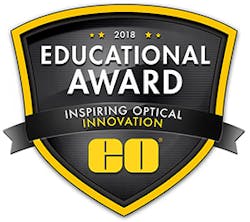
Optical components manufacturer Edmund Optics (EO; Barrington, NJ) has named the recipients of its 2018 Educational Award program. This award is given in recognition of outstanding undergraduate and graduate optics programs in science, technology, engineering, and mathematics at nonprofit colleges and universities worldwide.
The EO Educational Award Team evaluated hundreds of applications to select 20 global finalists. $45,000 in the company's products will be awarded to the Gold, Silver, and Bronze winners in the Americas and Europe, in support of their research. The remaining finalists will all receive a $500 product matching grant to assist with their research. Additionally, the recipient of the Norman Edmund Inspiration Award, which is an additional $5000 in products, is chosen from the 20 global finalists and best embodies the legacy of the company's founder, Norman Edmund.
In the Americas, the Gold Award of $10,000 in products was awarded to Yongmin Liu at Northeastern University (Boston, MA) for the development of ultrathin metasurfaces to create a new type of augmented reality glasses with small form factor, wide field of view (FOV), high coupling efficiency, and suppressed chromatic aberration.
The Silver Award of $7500 in products was awarded to Tyler Iorizzo at the University of Massachusetts Lowell (Lowell, MA) for the development of an imaging device to identify nonmelanoma skin cancer.
The Bronze Award of $5000 in products was awarded to Anthony LoCurto at Iowa State University (Ames, IA) for the development of a fluorescence microscope setup to detect microplastic levels for different water samples.
In Europe, the Gold Award of €7,000 in products was awarded to Stefan Kalies at the Leibniz University of Hannover Institute of Quantum Optics (Hannover, Germany) for a project that combines imaging and manipulation of cardiac aggregates or intestinal organoids to study regeneration with a micro-to-mesoscopic optical manipulation platform.
The Silver Award of €5,000 in products was awarded to Jamie Vovrosh at the University of Birmingham (Birmingham, England) for a project that aims to make a portable quantum gravity gradiometer, turning a bulky and heavy lab-based system into a portable system, while maintaining the sensitivity achieved in the lab.
The Bronze Award of €3,000 in products was awarded to Alessandra Franceschini at the European Laboratory for Non-Linear Spectroscopy and the University of Florence (Florence, Italy) for a project to build a novel dual-view inverted dual-slit confocal light-sheet fluorescence microscope for fast high-resolution imaging of centimeter-sized tissues.
The Norman Edmund Inspiration Award was awarded to Zohreh Hosseinaee at the University of Waterloo (Waterloo, ON, Canada), who submitted a project that focuses on developing novel optical imaging technology for noncontact, in vivo imaging of stem cells in the human eye. Characterization of these cells and understanding their role in human corneal tissue could open new paths for developing therapies of corneal diseases. The ability to view these cells allows young researchers to develop technologies for differentiating healthy and diseased stem cells using optical methods such as fluorescent dyes, light absorption, and scattering properties (as these methods are accurate, fast, and mostly noninvasive). In addition, since stem cell therapy is one of the cutting-edge therapeutic approaches in ophthalmology, projects like Hosseinaee’s have the potential to inspire researchers and companies to develop optic-based therapeutic methods for targeted therapy specified on stem cells.
For more information, please visit www.edmundoptics.com/award.